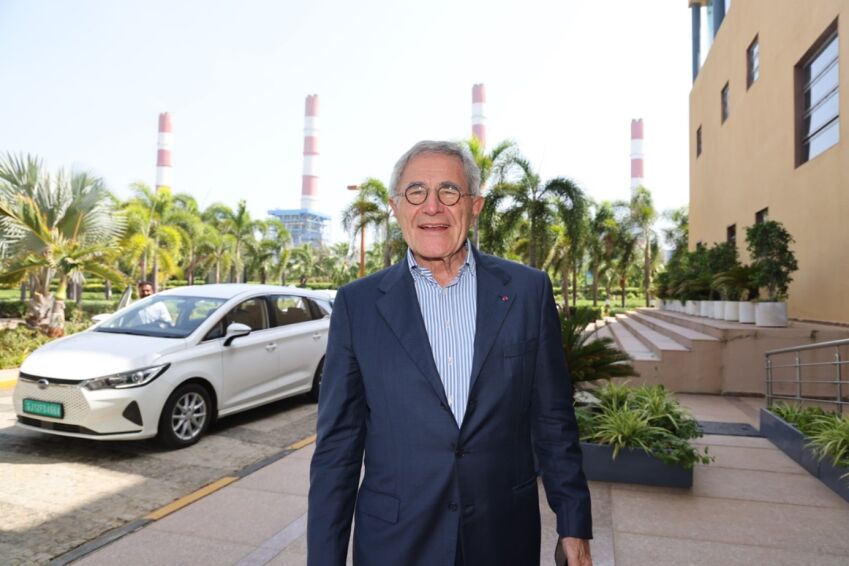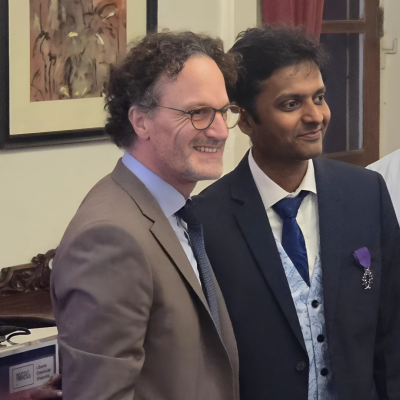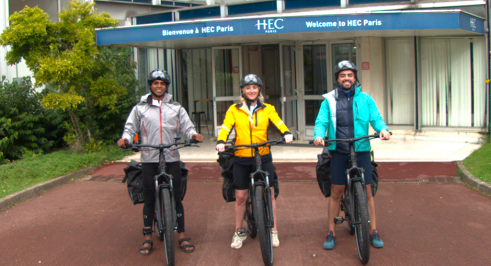 Actualités
Actualités 
Visit of Gérard Mestrallet to India
Mr Gérard Mestrallet, French President Macron’s Special Envoy for the India-Middle East-Europe Economic Corridor (IMEEC), undertook a visit to Gujarat, on 16th-17th September 2024 to better understand India’s infrastructures and development strategy, in p
Mr Gérard Mestrallet, France’s Special Envoy for IMEEC, visits India to boost connectivity between France and India.
During his visit, Mr Mestrallet, accompanied by his diplomatic advisor, military advisor, and Mr Jean-Marc Sere-Charlet, Consul General of France in Mumbai, went to the Mundra port as it is one of the main points of this corridor, and met economic actors involved in this project. They visited the terminals and renewables energies facilities recently built in Mundra. India and France, being at the entry and end points of this transnational rail and shipping route, have a shared interest and responsibility to develop this project to enhance trade accessibility and economic cooperation.
France is the first signatory country of the project to have officially appointed a dedicated special envoy. Mr Mestrallet undertook his first official trip, in this capacity, as part of the official visit of President Emmanuel Macron for India’s 75th Republic Day in January 2024 as chief guest. On this occasion, IMEEC was identified as a strategic area of cooperation between France and India.
During his second visit, Mr Mestrallet highlighted that the “existing direct shipping line between Mundra and Marseille is an asset which displays competitive time for export and import flows”. The delegation also underlined the strategic role that some major French and European companies could play in the project - for instance, CMA-CGM, headquartered in Marseille and with an important footprint in Mumbaï, is already operating one terminal in Mundra and has boosted sea-connectivity across India.
Speaking on the project, special Envoy Gérard Mestrallet remarked: “IMEEC will allow to substantially step up our cooperation in key focus areas such as low carbon energies, digital data and port-to-port partnerships”. As IMEEC also has a European dimension, this project could become a flagship project of the EU’s “Global Gateway” connectivity strategy.
In the coming months, France will actively work with Indian government officials and companies to find a common ground to facilitate the IMEEC pre-project phase. The special Envoy will return to India for a series of official meetings in New Delhi in November to demonstrate France’s strong commitment to this initiative.
Gérard Mestrallet’s interview to The Economic Times
Q: What does France plan to do with India jointly on IMEEC?
A: IMEEC’s project will benefit strongly from the Indo-French strategic and universal partnership. The Corridor places India and France at the entry and end points of this logistics Corridor. Hence, there is a shared interest, and responsibility, between India and France to play a leading role.
Work has started: during the official visit of President Macron for India’s 75th Republic Day, IMEEC was high on the agenda. This visit gave me the opportunity to meet the Indian officials in charge of the IMEEC’s strategy in New Delhi – we follow up regularly on the subject with the Indian Embassy in Paris.
My second visit in India is aimed at meeting stakeholders of the port of Mundra, to better understand the features of this major point of interconnection and develop cooperation with our own local and economic actors. I also plan to come back by the end of the year for new meetings in New Delhi.
As Indo-French cooperation on IMEEC is essential, joint initiatives will be discussed by the end of year as well at the France-India Business days in Marseille next week. It should enable us to build a collective governance and to shape IMEEC’s strategic vision with the most active countries.
Q: Which French port will be designated for IMEEC? Is there any plan to assign any protocols with an Indian ports?
A: Upon signing of the MoU, the port of Marseille was identified as the main entry and exit port of IMEEC in France. It is actually excellent news for Indian companies who have become strategic trading partners in the Grand Port Maritime de Marseille (GPMM). Trade between Marseille and India has recorded a continued growth in recent years. The Port of Marseille is connected to India by several direct shipping lines that optimizes time for export and import flows.
The city of Marseille hosts CMA-CGM, one of the major French global players in shipping, and a key investor in port terminals in India and around the world. Furthermore, Marseille is a major hub for hydrogen and digital data and is well connected to the European market. Additional investments will be made to further develop connectivity and accelerate the potential of Marseille as a major hub for hydrogen and digital data which is well connected to the European market.
In the coming months, France will actively work both with Indian government officials and companies towards an enhanced cooperation between the ports of Marseille and Mundra to take prospective studies forward on IMEEC.
The interview was published on The Economic Times website on 18th September 2024.
Gérard Mestrallet’s interview to CNBC-TV18
No set timeline for IMEEC construction, emphasises France’s special envoy Gerard Mestrallet
In an interview to CNBC-TV18, Gerard Mestrallet, France’s Special Envoy for IMEEC, described the IMEEC as not only a key infrastructure initiative but also a potential flagship project within the EU’s global gateway strategy.
The India-Middle East Europe Economic Corridor (IMEEC) is poised to be a transformative infrastructure project, uniting India, the Middle East, and Europe in a strategic network to bolster trade and connectivity.
In an interview with CNBC-TV18, Gerard Mestrallet, France’s Special Envoy for IMEEC, emphasised that bilateral discussions have occurred between participating countries, including the European Union. He described the IMEEC as a key infrastructure initiative and a potential flagship project within the EU’s global gateway strategy.
"This project is covering all the criteria to become a strategic project, a flagship project for the global gateway strategic initiative from the EU," he asserted.
Despite the enthusiasm surrounding the initiative, Mestrallet acknowledged the complexity of the project.
When asked about a timeline for construction, he refrained from providing a precise date, stating, "There is no precise time frame for the project." He underscored that the IMEEC represents a monumental infrastructure endeavour designed for the 21st century.
As such, it necessitates thorough pre-project studies, including feasibility and market assessments, which are currently underway.
A crucial aspect of the IMEEC is the connection between its endpoints: The Mundra Port in Gujarat, India, and the Marseille Port in France. Mestrallet recently visited Mundra to understand the port’s capabilities and engage with local stakeholders, including the Adani Group, which operates the facility.
Mestrallet noted that the Mundra port is not only vital due to its geographical positioning but also because of its role in the Mundra Special Economic Zone, which is becoming a hub for manufacturing green energy technologies, such as solar panels and wind equipment.
Below are the excerpts from the interview:
Q: What is the progress of the IMEEC project?
Mestrallet: The IMEEC project aims at creating an economic corridor, a link of connectivity between India, the Middle East and Europe with three legs, the first leg between India and the Arabic continent on the southeast, which is a maritime leg.
The second leg, which is a terrestrial leg between the southeast of the Arabic continent and Haifa, crossing over Saudi Arabia, Jordan, and Israel. And the third leg, the maritime leg, from Haifa to Europe and to Marseille, which is the point of exit to all Western Europe.
It’s a very, very important project to increase and boost connectivity by the transport of goods, of energy, of green hydrogen, and also digital data through cables.
So far, there have been bilateral talks between us and other countries, including the European Union. This project, which is a main project, which will be one of the most important infrastructure projects of the 21st century, this project covers all the criteria to become a strategic project, a flagship project for the global gateway strategic initiative from the EU.
Q: You are looking to have a connection between the endpoint of the IMEEC, which is the Marseille Port and also the Mundra port, which is a starting point. You visited the Mundra port in Gujarat recently. What were you trying to understand there? And what has been your message and conversation with stakeholders there, also the Adani group, which operates the Mundra port?
Mestrallet: The Mundra port and Marseille in France are the two ends of the corridor. So France and India are playing a key role in this project, not only because they are the two ends of the project, but also because Prime Minister Modi and President Emmanuel Macron were at the origin of the project. They have had talks in New Delhi during the G20. While President Macron had been invited as a special guest for the Republic Day on the 26th of January this year, IMEEC was also at the agenda, and the two chief of states have been talking about IMEEC and strongly pushing for that. So France and India are very key.
Mundra port has a key advantage by its size, by its position, by its management, and there is also the Mundra special economic zone with lots of activities, including manufacturing activities for green energy, solar panels and wind equipment.
Q: By when could all the countries involved be on one page and begin activating work on the construction of the IMEEC corridor?
Mestrallet: There is no precise time frame for the project. In any case, we have to know and to realise that it is one of the major infrastructures in the world for the 21st century. Therefore, it will take the first time and it will be built for the century. Such a project requires lots of pre-project studies, pre-feasibility studies, market studies, and we are in this period.
The interview was published on CNBC-TV18 website on 21st September 2024.






Commentaires
Vous devez être connecté pour laisser un commentaire. Connectez-vous.